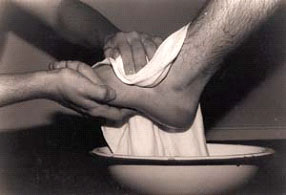Dear Parishioners,
There was a bit of controversy for
some after Pope Francis broke
tradition by not celebrating Mass in a major cathedral or basilica on
Holy Thursday and by washing the feet of two females at the Mass of the Lord’s Supper. If you read the liturgical instructions for
the day (as found in the Roman Missal),
it does indicate that the feet of twelve men
(vir in Latin)
should be washed.
Frankly, I am not usually the
type of person to ignore deliberately
and knowingly official liturgical guidelines. At the same time, this particular action of
our Holy Father did not really upset me. It seemed like the natural, pastoral
thing to do, given the fact of his surroundings—the Roman reform center for
minors, Casal del Marmo.
Here is a portion from our Holy Father’s homily:
It is the Lord’s example: he is the most important, and he washes feet, because with us what is highest must be at the service of others. This is a symbol, it is a sign, right? Washing feet means: “I am at your service”. And with us too, don’t we have to wash each other’s feet day after day? But what does this mean? That all of us must help one another. Sometimes I am angry with someone or other ... but... let it go, let it go, and if he or she asks you a favour, do it.
Help one another: this is what Jesus teaches us and this what I am doing, and doing with all my heart, because it is my duty. As a priest and a bishop, I must be at your service. But it is a duty which comes from my heart: I love it. I love this and I love to do it because that is what the Lord has taught me to do. But you too, help one another: help one another always. One another. In this way, by helping one another, we will do some good.
I thought about what Pope Francis
attempted to do—to follow the example of Jesus and to teach others to do the same. I don’t think that he was making any
statement other than service of others. For those who try to read more into it—that he’s opening the door to women’s ordination or
that he has no regard for liturgical
guidelines—I think that they will be pretty disappointed. Like Jesus, when He was accused of curing someone on the Sabbath and breaking Jewish law (see Luke 13:14), I think that
our Holy Father simply took this time to show humility and love,
and to use a very teachable moment.
If I apply this foot-washing scenario to our own parish,
who would be the people whose feet should be washed? How about those who give their service to the parish regularly: the ushers, the extraordinary ministers of
Holy Communion, the secretaries, the altar servers, my brother priests,
etc. How about those mothers and fathers who sacrifice daily for their children? How about those who would be seen as outcasts, disenfranchised, immigrants, elderly, or impoverished? Granted, not
all of them may be men. Would I be seen by some as radical or controversial? Probably. Rather, I would hope to be seen as joining
company with Jesus (and apparently Pope Francis) who “came not to be served but to serve and to give his life as a ransom
for many.” (Mark 10: 45)
The average observer—inside or
outside of the Church—will more than likely see a priest, bishop or even a pope who is willing to be of service to
his people as “Christ-like,” humble and self-giving and will probably not
be delving into some deeper hidden meaning of this action.
Fr. Ed Namiotka
Pastor


No comments:
Post a Comment